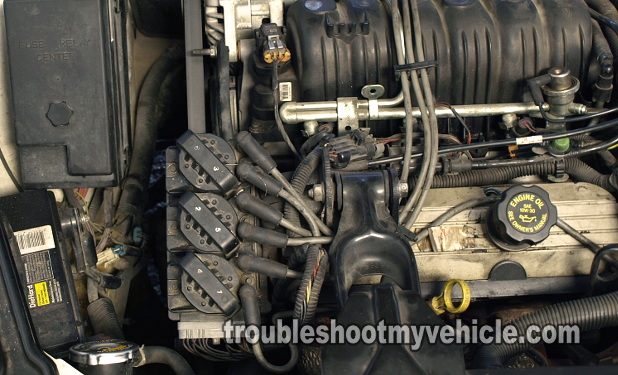
Troubleshooting a misfire condition or misfire codes (OBD II) on your GM 3.8L V6 equipped vehicle (Buick, Chevy, Olds, Pontiac) can be quite a challenge. Why? Because so many different things can cause a misfire (also known as an engine miss or ‘dead’ cylinder).
In this tutorial, I'll present you with some of the basics you need to know to successfully diagnose a misfire condition and the information you need (in the form of links to tutorials).
The tutorials (I'm linking you to) will show you some of the specific tests that you may need to do to get to the root cause of the problem.
Contents of this tutorial:
ES ![]() You can find this tutorial in Spanish here: Cómo Probar Fallas En Cilindro (GM 3.8L) (at: autotecnico-online.com).
You can find this tutorial in Spanish here: Cómo Probar Fallas En Cilindro (GM 3.8L) (at: autotecnico-online.com).
What Is A Misfire Condition?
The definition of misfire condition: the engine in your car is not firing on all cylinders. If even one cylinder is not contributing to engine power (normally referred to as a dead cylinder), you're gonna' feel it. Here are some of the most common symptoms of a misfire condition on your GM 3.8L:
- The check engine light will be on.
- One or more misfire codes will be stored in the car or mini-van's computer memory (if OBD II equipped).
- P0300 Random Cylinder Misfire.
- P0301 Cylinder #1 Misfire.
- P0302 Cylinder #2 Misfire.
- P0303 Cylinder #3 Misfire.
- P0304 Cylinder #4 Misfire.
- P0305 Cylinder #5 Misfire.
- P0306 Cylinder #6 Misfire.
- Misfire is present, but no misfire codes are registered in the computer's memory.
- Lack of power upon acceleration.
- Smell of unburned gas exiting the tail pipe.
- Rough idle and may stall.
- Cranks but does not start.
- Will not pass the emissions tests.
- Bad gas mileage.
What Causes A Misfire Condition?
Every cylinder, in your V6, needs to have air, fuel, and spark to work. If any one of them is missing from the equation, that cylinder will go dead. What sucks, is that so many things can cause a misfire condition (or a rough idle condition). The cause of the misfire can be in any one of the following systems:
Ignition System: In a nutshell, the ignition system on the GM 3.8L V6 consists of three ignition coil packs, an ignition control module, spark plugs, and spark plug wires. The majority of misfire conditions have their root cause here.
- Bad spark plugs:
- Broken ceramic insulator.
- Center electrode's gap is closed due to carbon build up (from oil burning within the cylinder).
- Worn center electrode.
- Carbon tracks on the ceramic insulator.
- Bad spark plug wires:
- Spark plug boot is torn.
- Carbon tracks inside the boot.
- The metal terminal that connects to the spark plug is missing.
- Bad Ignition Coil Pack:
- One or both towers (of the same ignition coil pack) are not firing off spark.
- Several towers from different coil packs are not firing off spark.
- Bad Ignition Control Module:
- The ignition module is not activating one coil pack and the end result is two ‘dead’ cylinders (since each coil pack feeds two cylinders with spark simultaneously).
Fuel System: The most common type of failure, in the fuel system of the 3.8L fuel-injected engine, is one or more fuel injectors going bad. Here are some more specifics:
- Bad Fuel Injector(s):
- Injector is fried internally and does not spray any fuel.
- Injector is clogged and does not sprays enough fuel.
- Injector is clogged/dirty and spray fuel in an incorrect spray pattern.
- Fuel injector is not being activated by the PCM.
- Fuel injector is not getting power (12 Volts).
Engine Mechanical Condition: An engine cylinder that is not producing enough compression, even if it has spark and fuel, will cause a misfire condition that will set a misfire code. Another thing that will cause a misfire (normally at idle) is vacuum leaks coming from a large vacuum hose or the intake manifold gasket.
- Low or No Engine Compression:
- One or two cylinders have low or no compression.
- Low or no engine compression will be the result of:
- worn cylinder head valves.
- Worn piston rings.
- Blown head gasket.
- Bad Intake Manifold Gasket:
- The intake gaskets are leaking coolant and this is a sure sign of gasket failure that can and does affect idle quality.
